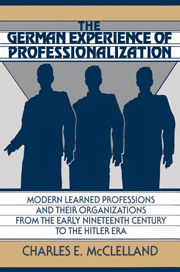 The German Experience of Professionalization
The German Experience of Professionalization Book contents
- Frontmatter
- Contents
- Acknowledgments
- Abbreviations
- Part I The problem of professions in Germany
- Part II The transition to modern professions in the early nineteenth century
- 3 The beginnings of modern professions in Germany
- 4 Professions between revolution and unification
- Part III Unified professions in a unified Germany?
- Part IV Breakthroughs and breakdowns: The professions enter the era of cartels and unions
- Part V The Weimar era
- Part VI The fate of professions under and after fascism
- A word about sources
- Index
3 - The beginnings of modern professions in Germany
Published online by Cambridge University Press: 06 July 2010
- Frontmatter
- Contents
- Acknowledgments
- Abbreviations
- Part I The problem of professions in Germany
- Part II The transition to modern professions in the early nineteenth century
- 3 The beginnings of modern professions in Germany
- 4 Professions between revolution and unification
- Part III Unified professions in a unified Germany?
- Part IV Breakthroughs and breakdowns: The professions enter the era of cartels and unions
- Part V The Weimar era
- Part VI The fate of professions under and after fascism
- A word about sources
- Index
Summary
There were professions in eighteenth-century Europe, as there had been for centuries. There were also learned people – savants, Gelehrten – a few of them professionally engaged in learning and science, but most of them not. Training for a profession, as the Germans and French called it, had little direct connection with advanced knowledge of a theoretical kind. Because Professionen were in fact trades, some of them skilled, education for them was readily carried out by the venerable system of apprenticeship or some other form of what today is called on-the-job training. The connection of high theoretical knowledge with practical occupations, a hallmark of modern professions, had not yet been made.
There were, to be sure, a few occupations that required higher education, but they were not easily classified as economically productive. Religion, law, and medicine were the three traditional callings requiring higher education. But there are two significant points about these three ancient professions. First, their objects were not of a concrete but rather of a highly abstract nature. Second, although higher education was a prerequisite, it did not necessarily prepare the professionals for the practice of their art.
Eighteenth-century England illustrates this paradox. So far ahead of the rest of Europe in commerce and empire-building, the English still maintained very varied and ad hoc methods for creating professionals. With the exception of the clergy, for which universities had been in large part created in the Middle Ages, practitioners of learned professions (e.g. law and medicine) got further training in extrauniversity institutions, such as the Inns of Court.
- Type
- Chapter
- Information
- The German Experience of ProfessionalizationModern Learned Professions and their Organizations from the Early Nineteenth Century to the Hitler Era, pp. 31 - 50Publisher: Cambridge University PressPrint publication year: 1991


